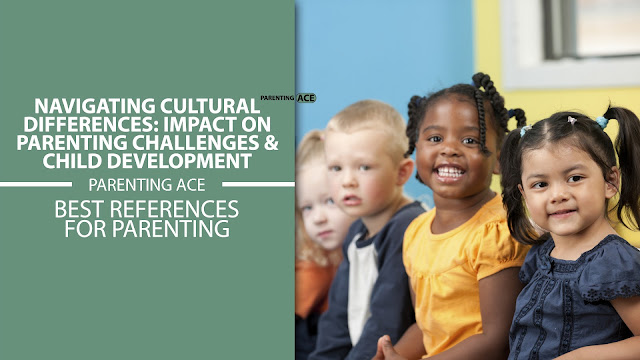Navigating Cultural Differences: Understanding the Impact on Parenting Challenges and Child Development
In today's globalized world, parenting transcends cultural boundaries, presenting both unique challenges and opportunities for families of diverse backgrounds. In our upcoming blog post, we delve into the intricate interplay between cultural differences, external stressors, and the impact on parenting. From navigating traditional practices within modern societies to addressing acculturation challenges faced by immigrant families, join us as we explore how cultural resilience shapes parenting experiences and influences child development outcomes. By fostering cultural sensitivity and embracing diversity, we can cultivate inclusive environments where every family feels empowered to navigate the complexities of parenting with confidence and compassion.
 |
| Navigating Cultural Differences: Impact on Parenting Challenges & Child Development |
Parenting is a universal experience, but the challenges it presents can vary significantly depending on cultural backgrounds. Cultural differences play a profound role in shaping parenting styles, attitudes, and expectations, thereby influencing the external stressors parents face and impacting child development. In this article, we delve into the complexities of cultural differences within the realm of parenting challenges, exploring their implications on the well-being and upbringing of children.
Cultural Diversity and Parenting Challenges
Cultural diversity encompasses a wide range of customs, beliefs, and practices that influence how individuals perceive and approach parenting. One of the primary challenges arising from cultural differences is the clash between traditional practices and modern societal norms. For immigrant families or those with multicultural backgrounds, balancing the cultural values inherited from their heritage with the expectations of the dominant culture can create tension and uncertainty in parenting.
For example, in collectivist cultures where family harmony and obedience to authority are highly valued, parents may prioritize interdependence and conformity in child-rearing practices. In contrast, individualistic societies emphasize autonomy and self-expression, leading to potential conflicts between parents and children regarding autonomy and decision-making.
Moreover, cultural norms regarding gender roles, discipline, and education can significantly impact parenting approaches and perceptions of success. For instance, cultures that prioritize academic achievement may place immense pressure on children to excel academically, leading to high levels of stress and anxiety.
External Stressors and Cultural Resilience
External stressors, such as socioeconomic disparities, discrimination, and acculturation challenges, intersect with cultural differences to shape parenting experiences. Immigrant families, in particular, often face heightened stress due to language barriers, financial instability, and social isolation, which can exacerbate parenting challenges.
Cultural resilience, however, offers a framework for understanding how cultural values and practices can serve as protective factors against external stressors. Strong cultural identity, community support networks, and adaptive coping mechanisms rooted in cultural traditions can mitigate the negative impact of stress on parenting and child development.
Impact on Child Development
The influence of cultural differences on parenting extends to child development outcomes. Cultural values shape children's socialization processes, cognitive development, and identity formation, influencing their perceptions of self and others. Moreover, cultural socialization practices, such as storytelling, cultural celebrations, and language transmission, contribute to the transmission of cultural heritage across generations.
However, conflicting cultural expectations and experiences of acculturation can pose challenges to children's sense of belonging and identity integration. Straddling multiple cultural worlds may lead to identity confusion or cultural dissonance, impacting psychosocial adjustment and mental health outcomes.
Navigating Cultural Sensitivity in Parenting
To address the complex interplay of cultural differences and parenting challenges, it is essential to cultivate cultural sensitivity and competence among parents, caregivers, and professionals working with families. This involves recognizing and respecting diverse cultural perspectives, engaging in open dialogue about parenting practices, and adapting interventions to align with families' cultural values and preferences.
Additionally, fostering inclusive environments that celebrate cultural diversity and promote cultural exchange can enhance mutual understanding and support among families from different backgrounds. By embracing cultural humility and valuing each family's unique strengths and experiences, we can create nurturing environments where children thrive and families flourish despite the challenges they may face.
Cultural differences significantly influence the challenges parents encounter and the impact of parenting on child development. By acknowledging the diverse cultural contexts in which families operate and adopting culturally sensitive approaches to parenting support and intervention, we can empower parents to navigate challenges effectively and foster positive outcomes for children across cultural boundaries. Ultimately, promoting cultural understanding and inclusion in parenting practices enriches the fabric of our society and nurtures the well-being of future generations.




